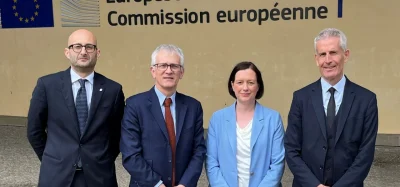An interview with… Marc Gispert, CEO, smart motors®
Posted: 6 August 2018 | Marc Gispert - smart motors | No comments yet
As part of Global Railway Review’s Going Digital in Rail Week, Marc Gispert, CEO of smart motors® shares the main objectives of his team which include developing the best asset life-cycle management policies, improving condition based maintenance (CBM) procedures and implementing the most adequate breakdown prediction methods.


What are the core values/foundations of smart motors® and what solutions can you offer the rail industry?
Railway operation must meet increasingly stringent quality and safety requirements. Due to the recent trends in solutions such as the Internet of Things (IoT) and big data playing an increasing part in many fields, innovative solutions that transform raw data into value-added information have a radical effect in the efficiency of railway maintenance.
At smart motors®, we can provide the real-time operation status of any asset that needs to be monitored. With this information, operators gain immediacy in decision-making processes which can improve service quality and availability.
These solutions also provide breakdown prediction information thanks to artificial intelligence algorithms applied to the data collected and allow condition based maintenance (CBM) actions in opposition to preventive maintenance calendars that prevail in classical models.
Where are your solutions currently working and what level of feedback are your customers giving?
We have developed solutions that are suitable for signalling, tracks, infrastructure and rolling stock. Furthermore, our solutions can monitor point machines for long periods of time. As a reference, our solutions have helped Barcelona Metro reduce the cost of their asset maintenance between 2009 and 2016 by 65 per cent, even though the total number of point machines increased by 67 per cent. We also helped with the total annual stoppage time due to breakdowns in those elements to be drastically reduced by 83.5 per cent – equivalent to 27 minutes (in 2016).
We are currently promoting our new train monitoring solution called Digital Train®. It aims to provide access to real-time data and historical registers to feed a new maintenance system based in the asset condition. With Digital Train it is possible to obtain failure details of the systems onboard the rolling stock. The ultimate goal is to migrate from traditional preventive maintenance to CBM.
There are several other transversal functionalities provided by the solution as it is a cross departmental tool. As an example, through Digital Train it is possible to better understand train occupancy and to draw the demand profiles of each station, which can assist improved planning of services.
In what ways do you expect smart motors® will have to adapt to meet the changing digitalisation demands of the rail industry in the years to come?
Condition monitoring almost offers unlimited possibilities to the railway sector in terms of improving availability through real-time data and streamlining maintenance costs thanks to implementing condition-based methods. This in general sounds positive but there is a negative: The large list of potential benefits can complicate the implementation of a monitoring project. This is a matter under discussion at international workshops and rail industry events.
It is a provider’s responsibility to show and clarify the benefits of this cultural change to the customers. Prior to any project, there is an acceptable level of expectation that the tools can provide. As partners, both the operator and provider must define a realistic strategy to ensure quick and long-term wins. Cooperation between companies is vital to foster a cultural change inside the operator’s service chain and for implementing new proceedings according to the system findings.
What would you say are the main reasons why customers choose smart motors® over your competitors?
We care about what is important for the customer. This is why smart motors® focus on delivering a complete service including what really helps the customer to improve services and investments in maintenance.
We offer tools that provide all the necessary information to speed up and improve the decision-making in the event of a breakdown in service.
We offer solutions to predict the most likely of breakdowns (90-95 per cent). The customer should know that these are between 50 per cent and 60 per cent of the total, so as not to have over expectations (the percentage depends on the asset).
Finally, we propose actions to modify preventive maintenance calendars according to the performance of the assets. We accompany the client so that they can foster the required cultural change within their company and to introduce the results of monitoring and predictive solutions.
The software we work with has proven to be useful with a very low percentage of false alarms. A high number of false alarms would cause the operator to stop using the tool because it would create more work than it saves.
The data visualisation tool is 100 per cent programmed by smart motors – from the beginning to the end. This gives us a lot of flexibility to offer customised information and allow the operator to configure the screens according to their requirements. Furthermore, it helps the operator feel more comfortable when interacting with our interface.
What’s next for smart motors’®? What can we expect from the company in the future?
smart motors is currently developing other solutions that follow the same principles as other types of assets. This is one of the tasks in which our main asset, our team of engineers, will focus on in the coming years. We continually work to improve our solutions, both technically and from a business concept and aim to prioritise the vision of the customer.
Furthermore, we find it is necessary to promote actions to better understand what the market demands and in what way the practically infinite possibilities of big data and IoT applied to the sector can provide more benefits to the operator.


Biography
Marc Gispert was a Researcher in the project to create a switch point machine monitoring solution fostered by the Polytechnic University of Catalonia and TMB (Barcelona). After the project’s success, Marc created smart motors® and has been the CEO for most of his professional career. Marc currently participates in several digitalisation and predictive maintenance events, sharing his know-how based on smart motors® achievements and his vision of a sustainable evolution of this discipline. He has an extensive technological training background, with specialisations in robotics, photonics and business administration (MBA ESADE Barcelona, HEC Paris, China Fundan University). As an entrepreneur, Marc spends his time helping other entrepreneurs and sharing his experience while creating ventures.








